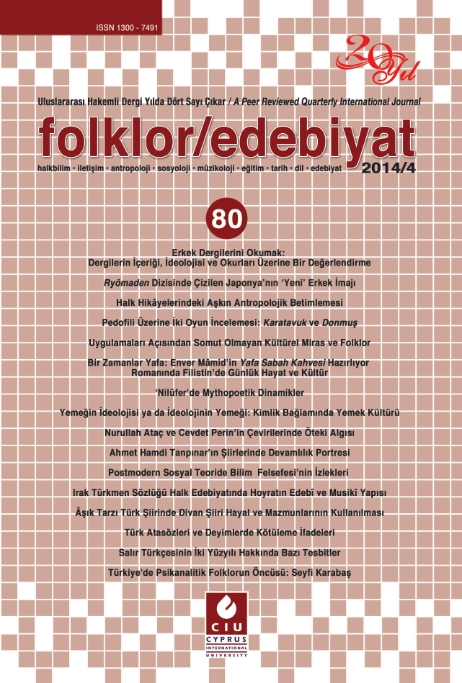Âşik Tarzi Türk Şiirinde Divan Şiiri Hayal Ve Mazmunlarinin Kullanilmasi
The Use of Poetic Themes and Concepts Peculiar to Divan Poetry in Wandering Minstrel Style Turkish Poetry
Author(s): Yakup PoyrazSubject(s): Cultural history, Poetry, Modern Age, Turkish Literature
Published by: Uluslararası Kıbrıs Üniversitesi
Keywords: Turkish Traditional Wandering Minstrel Poems; Poetry; Poetic Themes; Concepts;
Summary/Abstract: In our history of literature, folk poetry has a more deep-rooted tradition than poetry. Contrary to common belief, although poetry and folk poetry were inspired by quite different sources and followed quite different paths from each other they are not completely disconnected from each other. For example: in Yunus Emre’s Divan syllabic meter and aruz prosody have been used side by side in addition to the use of literature’s poetic themes and concepts. Some intellectuals and poets despised and blamed wandering minstrels for simplicity at a time when these two literary movements moved ahead in their own natural styles. Under these unfavourable conditions some wandering minstrels tended to write/recite elaborate poems with lexiphanicism in order to prove themselves, which distanced them from the simplicity of folk literature. The effort of trying to prove themselves sometimes led them to use some poetry forms and even aruz prosody. The wandering minstrel tradition of folk literature evolved to âşıklık ( turkish popular poet-singer) tradition in sixteeenth century and started to be inspired more apperently by poetry. During this period the popular poet-singers not only practised upon poetry prosody and styles but also poetry contents. The popular poet-singers using poetry poetic themes and concepts peculiar to poetry also used them in poems with syllabic meter. In this work, we will study 17th, 18th and 19th centuries poetry poetic themes and concepts (two basic characteristcs of poetry) in poems by folk poets raised as traditional Turkish popular poet-singers and we will draw attention to common traits and concepts between two poetry traditions.
Journal: Folklor/Edebiyat
- Issue Year: 20/2014
- Issue No: 80
- Page Range: 245-273
- Page Count: 29
- Language: Turkish

